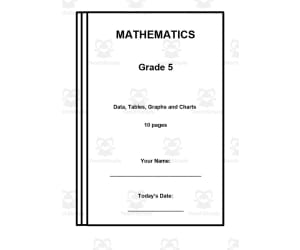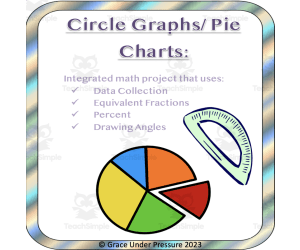2,826 products added recently
Graphing Charts
Graphing Charts are tools that show how to represent data using graphs such as bar graphs, line graphs, and pie charts. These charts guide students in understanding how to plot points, label axes, and interpret graphed information. Incorporate graphing charts into your math curriculum to develop students' data analysis skills.
Gamified Algebra Adventures - Mathematics
Math, Algebra, Early Math, Basic Operations, Numbers, Patterns, Place Value, Graphing, Measurements, Money, Grade 2, 3, 4, 5, 9, 10, 11, 12, Activities, Games, Projects, Centers, Teacher Tools, Assessments, Charts, Diagrams, Lesson Plans, Presentations
Embark on an adventure in the world of algebra with Gamified Algebra Adventures: Mathematics, an extensive and engaging high school algebra workbook that translates challenging mathematical concepts to adventurous and fun missions. Written by Syed Hammad Rizvi, this 466-page digital textbook for grade 9 to 12 encompasses fundamental concepts of algebra ranging from basic to advanced topics such as: • Variables • Expressions • Equations • Inequalities • Functions • Linear Systems • Polynomials • Factoring • Quadratics • Rational Expressions • Radicals With adventurous names for every chapter like "The Algebraic Quest Begins: Unveiling Variables," "The Great Math Treasure Hunt," and "Navigating the Mathematical Maze," Gamified Algebra Adventures: Mathematics is an engaging math textbook that combines the concepts of algebra with fun adventures that are apt for grade 9 to 12 in math. This textbook has been optimized with SEO keywords that enable viewers to easily access it while giving parents and teachers complete guidance on how to accomplish high school math for teenagers with its gamified algebra lessons that are perfect for making math fun and easy while improving grades in math. Why Parents/Schools Love It: Engaging Gamified Learning Platform: Chapters mapped as ‘adventure quests’ and case studies help transform boring sessions of learning Algebra into thrilling missions, encouraging students and overcoming math phobias. All-Rounded Coverage: This textbook covers 104 chapters with explanations on how to solve algebra problems starting from the basics of variables to the advanced topic of radicals. Applications: These models can include the behavior of the economy, physics, and other fields, where the use of mathematics can be demonstrated in applicatio Flexible and Inexpensive: The digital version is ideal for homeschooling or as a supplement for the classroom as well as for individual self-study with easy-to-understand text. Helps to Build Confidence and Skills: It is designed to emphasize the mastery of problem solving, visual models and representation, and generalization concepts in order to prepare the students for tests and college studies. Target Students : On the basis of an overall analysis of the Table of Contents and some sampled material from different chapters (starting off with basics, for example, variables and expressions in initial chapters, then moving on to more complex subjects in quadratic equations, rational expressions, and radical equations in Latter chapters), it can be said that this particular book has applications for grades 9 to 12, and it fits into an overall curriculum for Algebra I and Algebra II, starting off with basics for those who were beginners (beginning grade 9 or an initial course in algebra, appropriate for those at grades 10 to 12 or those pursuing an advanced course in algebra). Additionally, it can be used by Middle-grade kids switching to High school or by those heading off to college for pre-calculus prep. Copyright/Terms of Use : This Book was copyrighted by Syed Hammad Rizvi. The use of this resource shall be for non-commercial purposes only. You shall not copy and redistribute, or sell any portion of this resource. What this means, among other things, is that you cannot upload it on the Internet so it can be downloaded by anyone on the Internet. In case you need to share this resource with fellow teachers, you can purchase the license from Teachsimple. Thank you for abiding by the conditions. This product is, of course, brought to you by Syed Hammad Rizvi
Author Creative Book Store
Rating
Tags GamifiedAlgebraAdventures, AlgebraWorkbook, HighSchoolMath, GamifiedLearning, MathAdventures, Grades9to12Math, InteractiveAlgebraGuide, AlgebraForTeens, STEMEducationResources, HomeschoolAlgebra
Data, Tables, Graphs and Charts Math Packet
Math, Graphing, Grade 5, Charts, Teacher Tools
Data, Tables, Graphs and Charts Math Packet The Data, Tables, Graphs and Charts Math Packet is an essential tool for progressive 5th-grade educators. This printable packet is ten pages long and available as a PDF file. It is designed to integrate data analysis, tables, graphs, and charts within the math curriculum. Key Learning Concepts Gathering data systematically. Recording results meticulously. Employing diverse types of tables, charts graphs including conversion diagrams for representation. Developing predictive abilities from acquired data. Engaging in informative discussions about findings. Understanding different types of averages: - mean median mode - This packet provides ample flexibility for students to interact with each page effectively. Learners are encouraged to actively analyze varying forms of data across multiple situations. They are prompted to make observations and formulate answers based on their findings. Possible Scenarios for Use Ideal as homework material after teaching sessions . Serves well as review material to reinforce learning concepts . Duplicates could be kept in an Emergency Substitute Kit. Iii could be employed as an assessment tool due to detailed coverage; offering thorough evaluation. Li /ol The versatility of this resource ensures deep engagement with complex ideas presented in easily understandable parts complete with answer keys—making it useable even by self-guided learners. A highly recommended addition that synchs well into any dynamic educator’s toolkit focused on cultivating independent critical thinking skills amongst youngsters today.
Author Elementary Resources 4 U
Tags Data Analysis, Tables, Graphs, Charts, Math
Math Project: Circle Graphs and Pie Charts
Math, Percentages, Geometry, Graphing, Statistics, Grade 4, 5, 6, 7, 8, Charts, Teacher Tools
This fun math project includes clear step-by-step instructions to show your students how to make a circle graph. This is a great way to review several math skills while showing how useful they can be! Tasks include: - Writing a survey question: Your students learn to write a question that has exactly six possible answers. - Collecting data: Your students can ask the members of your class their question. They collect data using a tally chart. They need to ask exactly 25 people. - Recording results as a fraction: Once they have their data, they can turn each answer into a fraction with a denominator of 25. - Calculating an equivalent fraction: Then, they calculate an equivalent fraction with a denominator of 100. - Working with percent (written as a decimal): Finally, they turn that fraction into a percent in decimal form. They use this percent to multiply by 360 degrees in a circle (they can use a calculator for this part) to find out how many degrees each answer gets. - Drawing angles with a protractor: They carefully draw the six angles in their pie chart, one by one. - Labeling a graph: They label the graph to make it clear for others to read. Grades to Use WIth: This math project works well in the middle grades (4-8) when students know how to use protractors, calculate with fractions and decimals, and make graphs. It could also work well in a high school special education classroom. Standards: CCSS7.G.A.2 Draw (freehand, with ruler and protractor, and with technology) geometric shapes with given conditions. Focus on constructing triangles from three measures of angles or sides, noticing when the conditions determine a unique triangle, more than one triangle, or no triangle. CCSS4.NF .C.5 Express a fraction with denominator 10 as an equivalent fraction with denominator 100, and use this technique to add two fractions with respective denominators 10 and 100. For example, express 3/10 as 30/100, and add 3/10 + 4/100 = 34/100. CCSS4.NF .C.6 Use decimal notation for fractions with denominators 10 or 100. For example, rewrite 0.62 as 62/100; describe a length as 0.62 meters; locate 0.62 on a number line diagram.
Author Grace Under Pressure
Tags Math Project, Circile Graphs, Pie Charts, Graphing, Data Collection, Percent, Angles, Protractor, Equivalent Fractions, 7/8 Pie Chart, Circle Graphs Math, Circle Graphs








